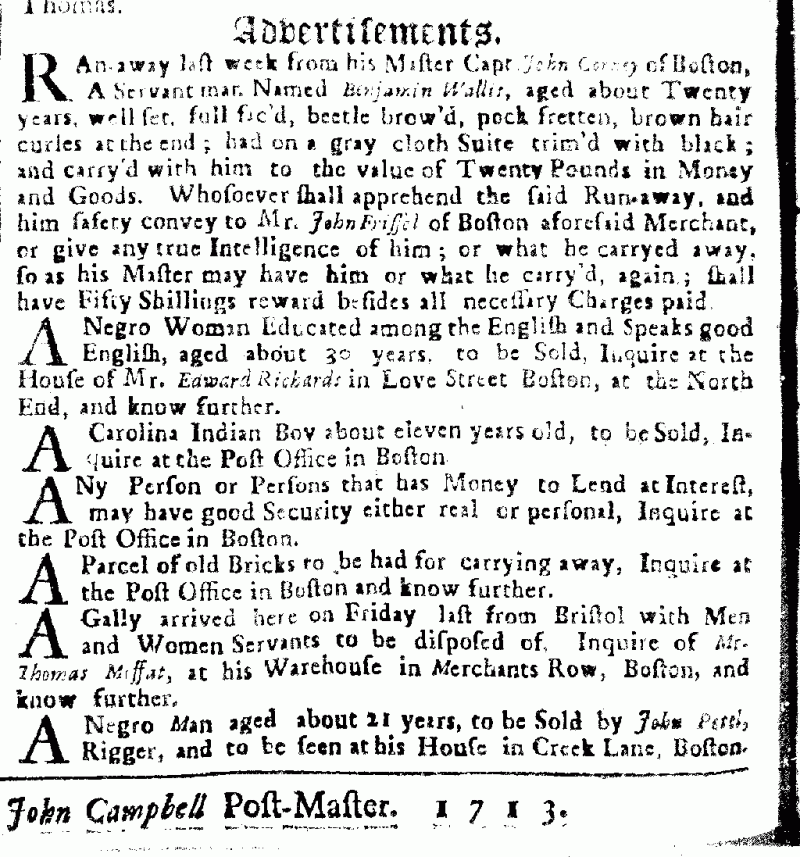Advertisements From the Boston News-Letter, 1713
Below sends notice of a runaway slave. The next two paragraphs are advertisements for an enslaved Black woman and enslaved American Indian boy. The two paragraphs after that are job advertisements. The last two paragraphs advertises servants from Bristol looking for work and an enslaved Black man. Slavery was legal in Massachusetts until 1783 with "the Quock Walker case".
"Massachusetts Constitution and the Abolition of Slavery". Mass.gov. https://www.mass.gov/guides/massachusetts-constitution-and-the-abolition... (Accessed November 9, 2018).

Advertisements
Ran-away last week from his Master Capt. John Corney of Boston, A Servant man Named Benjamin Wallis, aged about twenty years, well fed, full fac'd, beetle brow'd, pock freten, brown hair curles at the end; had on a gray cloth Suite trim'd with black; and carry'd with him to the value of Tewnty Pounds in Money and Goods. Whosoever shall apprehend the said Run-away, and him safety [sic.] convey to Mr. John Frissel of Boston aforesaid Merchant, or give any true Intelligence of him; or what he carryed away, so as his Master may have him or what he carry'd, again; shall have Fifty Shillings reward besides all necessary Charges paid.
A Negro Woman Educated among the English and Speaks good English, aged about 30 years, to be Sold, Inquire at the House of Mr. Edward Richards in Love Street Boston, at the North End, and know further.
A Carolina Indian Boy about eleven years old, to be sold, Inquire at the Post Office in Boston.
Any Person or Persons that has Money to Lend at Interst, may have good Security either real or personal, Inquire at the Post Office in Boston.
A Parcel of old Bricks to be had for carrying away, Inquire at the Post Office in Boston and know further.
A Gally arrived here on Friday last from Bristol with Men and Women Servants to be disposed of. Inquire of Mr. Thomas Moffat, at his Warehouse in Merchants Row, Boston, and know further.
A negro Man aged about 21 years, to be Sold by John Perel, Rigger, and to be seen at his House in Creek Lane, Boston.
John Campbell Post-Master. 1713
Public Domain
Public Domain is a copyright term that is often used when talking about copyright for creative works. Under U.S. copyright law, individual items that are in the public domain are items that are no longer protected by copyright law. This means that you do not need to request permission to re-use, re-publish or even change a copy of the item. Items enter the public domain under U.S. copyright law for a number of reasons: the original copyright may have expired; the item was created by the U.S. Federal Government or other governmental entity that views the things it creates as in the public domain; the work was never protected by copyright for some other reason related to how it was produced (for example, it was a speech that wasn't written down or recorded); or the work doesn't have enough originality to make it eligible for copyright protection.